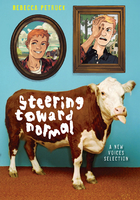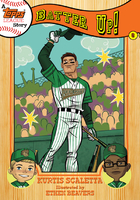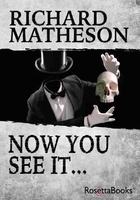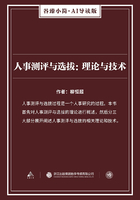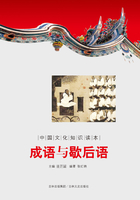The Business Room on the first floor of SIR CLAUDE MULHAMMER'S London house. Early afternoon. SIR CLAUDE writing at desk. Enter EGGERSON.
SIR CLAUDE
Ah, there you are, Eggerson! Punctual as always.
I'm sorry to have to bring you up to London
All the way from Joshua Park, on an errand like this.
But you know my wife wouldn't like anyone to meet her
At Northolt, but you. And I couldn't send Colby.
That's not the way to arrange their first meeting,
On her return from Switzerland.
EGGERSON
Impossible, Sir Claude!
A very delicate situation —
Her first meeting with Mr. Simpkins.
But I was glad of the excuse for coming up to London:
I've spent the morning shopping! Gardening tools.
The number of things one needs for a garden!
And I thought, now's the moment to buy some new tools
So as not to lose a moment at the end of the winter.
And I matched some material for Mrs. E.,
Which she's been wanting. So she'll be pleased.
Then I lunched at the store — they have a restaurant;
An excellent lunch, and cheap, for nowadays.
But where's Mr. Simpkins? Will he be here?
SIR CLAUDE
I had to send him to the City this morning,
But he'll be back, I hope, before you leave.
EGGERSON
And how's he getting on? Swimmingly, I'm sure,
As I've heard nothing since the last time I came.
SIR CLAUDE
Well, of course, Eggerson, you're irreplaceable …
EGGERSON
Oh, Sir Claude, you shouldn't say that!
Mr. Simpkins is far better qualified than I was
To be your confidential clerk.
He was finding his feet, very quickly,
During the time we worked together.
All he needs is confidence.
SIR CLAUDE
And experience.
With a young man, some readjustment is necessary.
But I'm satisfied that he's getting the hang of things,
And I think he's beginning to take a keen interest.
EGGERSON
And getting over his disappointment?
Of course, I never mentioned that:
It's only what you told me.
SIR CLAUDE
About his music.
Yes, I think so. I understand his feelings.
He's like me, Eggerson. The same disappointment
In a different form. He won't forget
That his great ambition was to be an organist,
Just as I can't forget … no matter.
The great thing was to find something else
He could do, and do well. And I think he's found it,
Just as I did. I shall tell him about myself.
But so far, I've left him to his own devices:
I thought he would fall into this way of life more quickly
If we started on a purely business basis.
EGGERSON
No doubt that's best. While he's still living
With his aunt in Teddington, and coming up daily
Just as I used to. And the flat in the mews?
How soon will that be ready for him?
SIR CLAUDE
They have still to do the walls. And then it must be furnished.
I'm trying to find him a really good piano.
EGGERSON
A piano? Yes, I'm sure he'll feel at home
When he has a piano. You think of everything.
But if I might make a suggestion: window boxes!
He's expressed such an interest in my garden
That I think he ought to have window boxes.
Some day, he'll want a garden of his own. And yes, a bird bath!
SIR CLAUDE
A bird bath? In the mews? What's the point of that?
EGGERSON
He told me he was very fond of bird watching.
SIR CLAUDE
But there won't be any birds — none worth watching.
EGGERSON
I don't know, Sir Claude. Only the other day
I read a letter in The Times about wild birds seen in London:
And I'm sure Mr. Simpkins will find them, if anybody.
SIR CLAUDE
Well, we'll leave that for the present. As we have a little time
Before you start for Northolt — the car will be ready —
Let's think what you're to say to Lady Elizabeth,
Coming back from the airport, about Colby.
I think, you ought to give her warning
Of whom she is to meet on her arrival.
EGGERSON
How would you like me to approach the subject?
SIR CLAUDE
Of course, she knows you were wanting to retire,
As we had some discussion about replacing you.
But you know she regards you — well, completely
As one of the household.
EGGERSON
That's a great compliment.
SIR CLAUDE
And well deserved; but rather inconvenient
When it comes to appointing a successor.
Makes it very difficult to replace you.
She thinks she ought to have a hand in the choosing;
And besides, she is convinced that she, of all people,
Is a better judge of character than I am.
EGGERSON
Oh, I wouldn't say that, Sir Claude!
She has too much respect for your business genius.
But it's true she believes she has what she calls 'guidance'.
SIR CLAUDE
Guidance. That's worse than believing in her judgment:
We could argue about that. You can't argue with guidance.
But if she appears to be puzzled, or annoyed
At my making the appointment during her absence,
You must say you had to leave under medical orders.
She's always been concerned about your state of health,
So she'll be sympathetic. And as for Colby —
Say that Mr. Simpkins was highly recommended,
And say that I had to make a quick decision
Because he'd had another very tempting offer.
Something like that. Don't make too much of it.
And I rather hope that she will take to him at once:
If so, she is certain to come to believe
That she chose him herself. By the way, don't forget
To let her know that he's very musical.
She can take him to concerts. But don't overdo it!
EGGERSON
I'll remember that. Music.
SIR CLAUDE
And by the way,
How much have you actually told him about her?
You remember, I asked you to prepare him a little;
There are some things you could say better than I could,
And ways in which you could reassure him
Better than I. He's more at ease with you
Than he is with me.
EGGERSON
Oh, you mustn't say that!
Though I've done my best to gain his confidence.
I did mention her interest in Light from the East.
SIR CLAUDE
And the Book of Revelation? And the Wisdom of Atlantis?
EGGERSON
Well, to tell the truth, Sir Claude, I only touched on these matters,
They're much too deep for me. And I thought, Mr. Simpkins,
He's highly educated. He'll soon begin to grasp them.
No, I haven't told him much about Lady Elizabeth.
But there's one thing I should like to know —
If you don't mind — before I go to meet her.
How soon do you propose to … explain Mr. Simpkins?
Regularize his position in the household?
You told me that was your eventual intention.
SIR CLAUDE
When — or indeed whether — I reveal his identity
Depends on how she takes to him. This afternoon
She will only learn that you have finally retired
And that you have a young successor,
A Mr. Colby Simpkins.
EGGERSON
Merely Mr. Simpkins.
SIR CLAUDE
The reasons for starting him during her absence
Are perfectly clear. But beyond that point
I haven't yet explained my plans to you.
Why I've never told her about him,
The reason for meeting him as merely Mr. Simpkins,
Is, that she has a strong maternal instinct …
EGGERSON
I realise that.
SIR CLAUDE
Which has always been thwarted.
EGGERSON
I'm sure it's been a grief to both of you
That you've never had children.
SIR CLAUDE
No worse, Eggerson,
Than for you and your wife, to have had a son
Lost in action, and his grave unknown.
EGGERSON
And you're thinking no doubt that Lady Elizabeth
Would be put in mind of the child she lost.
SIR CLAUDE
In a very different way, yes. You might say mislaid,
Since the father is dead, and there's no way of tracing it.
Yes, I was thinking of her missing child:
In the circumstances, that might make her jealous.
I've explained all this to (Colby — Mr. Simpkins.
EGGERSON
I see what you mean.
SIR CLAUDE
She must get to like him first:
And then, Eggerson, I am not unhopeful
That, under the impression that he is an orphan,
She will want us to adopt him.
EGGERSON
Adopt him! Yes, indeed,
That would be the solution. Yes, quite ideal.
SIR CLAUDE
I'm glad you agree. Your support will be helpful.
EGGERSON
I'm sure I shall be very happy to commend him.
SIR CLAUDE
You mustn't overdo it! But your approval matters.
You know she thinks the world of your opinion.
EGGERSON
Well, I believe that once or twice, perhaps …
But I'm afraid you overrate my influence.
I have never been able to make her like Miss Angel;
She becomes abstracted, whenever I mention her.
SIR CLAUDE
But she knew about Lucasta — Miss Angel, from the start.
That was one difficulty. And there are others.
For one, they're both of them women.
EGGERSON
True.
SIR CLAUDE
But I don't think she takes much notice of Miss Angel.
She doesn't see her. And Miss Angel
Will soon be getting married, I expect.
EGGERSON
And so I hope. A most suitable arrangement.
But will you tell me this: if it comes to the point
At which Lady Elizabeth wants to adopt him —
An admirable solution — then what follows?
Will you let her know, then, that Mr. Simpkins
Is actually your son?
SIR CLAUDE
That's where I'm in the dark.
I simply can't guess what her reaction would be.
There's a lot I don't understand about my wife.
There's always something one's ignorant of
About anyone, however well one knows them;
And that may be something of the greatest importance.
It's when you're sure you understand a person
That you're liable to make the worst mistake about him.
As a matter of fact, there's a lot I don't know
About you, Eggerson, although we worked together
For nearly thirty years.
EGGERSON
Nearly thirty-one.
But now you put it so convincingly,
I must admit there's a lot that I don't understand
About my wife.
SIR CLAUDE
And just as much
She just doesn't know about you. And just as much
You don't know about me — I'm not so sure of that!
My rule is to remember that I understand nobody,
But on the other hand never to be sure
That they don't understand me — a good deal better
Than I should care to think, perhaps.
EGGERSON
And do I infer
That you're not sure you understand Mr. Simpkins, either?
SIR CLAUDE
A timely reminder. You may have to repeat it.
But he should be back by now. And then I'll leave you.
I must telephone to Amsterdam, and possibly to Paris.
But when you return with Lady Elizabeth
I'll be ready waiting to introduce him.
[Enter COLBY SIMPKINS with briefcase]
SIR CLAUDE
Ah, Colby, I was just saying to Eggerson
It was time you were back. Was your morning satisfactory?
COLBY
I've got what you wanted, Sir Claude. Good afternoon,
Mr. Eggerson. I was afraid I'd miss you.
EGGERSON
I'm off in half an hour, Mr. Simpkins.
SIR CLAUDE
I'll leave you now. But when Eggerson comes back
With Lady Elizabeth, I will rejoin you.
[Exit SIR CLAUDE]
COLBY
I'm glad you don't have to leave just yet.
I'm rather nervous about this meeting.
You've told me very little about Lady Elizabeth,
And Sir Claude himself hasn't told me very much:
So I've no idea how I ought to behave.
B. Kaghan has told me something about her,
But that's rather alarming.
EGGERSON
Mr. Kaghan is prejudiced.
He's never hit it off with Lady Elizabeth.
Don't listen to him. He understands Sir Claude,
And he's always been very grateful to Sir Claude,
As he ought to be. Sir Claude picked him out
And gave him his start. And he's made the most of it —
That I will say. An encouraging example
For you, Mr. Simpkins. He'll be a power in the City!
And he has a heart of gold. But not to beat about the bush,
He's rather a rough diamond. Very free and easy ways;
And Lady Elizabeth has never taken to him.
But you, Mr. Simpkins, that's very different.
COLBY
I don't know why it should be so different.
I like B. Kaghan. I've found him very helpful
And very good company apart from business.
EGGERSON
Oh yes, Mr. Kaghan is very good company.
He makes me laugh sometimes. I don't laugh easily.
Quite a humorist, he is. In fact, Mrs. E.
Sometimes says to me: 'Eggerson, why can't you make me laugh
The way B. Kaghan did?' She's only met him once;
But do you know, he began addressing her as Muriel —
Within the first ten minutes! I was horrified.
But she actually liked it. Muriel is her name.
He has a way with the ladies, you know.
But with Lady Elizabeth he wasn't so successful.
She once referred to him as 'undistinguished';
But with you, as I said, it will be very different.
She'll see at once that you're a man of culture;
And besides, she's very musical.
COLBY
Thank you for the warning!
EGGERSON
So if you don't mind, I shall mention at once
That you are a musician.
COLBY
I'll be on my guard.
EGGERSON
Your music will certainly be a great asset
With Lady Elizabeth. I envy you that.
I've always sung in our voluntary choir
And at the carol service. But I wish I was musical.
COLBY
I still don't feel very well prepared for meeting her.
[A loud knock. Enter B. KAGHAN]
KAGHAN
Enter B. Kaghan. Hello Colby!
And hello Eggers! I'm glad to find you here.
It's lucky for Colby.
EGGERSON
How so Mr. Kaghan?
KAGHAN
Because Lucasta's with me! The usual catastrophe.
She's come to pry some cash from the money-box.
Bankrupt again! So I thought I'd better bring her
And come upstairs ahead, to ease the shock for Colby.
But as you're here, Eggers, I can just relax.
I'm going to enjoy the game from the sidelines.
[Enter LUCASTA ANGEL]
LUCASTA
Eggy, I've lost my job!
EGGERSON
Again, Miss Angel?
LUCASTA
Yes, again! And serve them right!
EGGERSON
You have been, I presume, persistently unpunctual.
LUCASTA
You're wrong, Eggy. It's rank injustice.
Two months I'd gone on filing those papers
Which no one ever wanted — at least, not till yesterday.
Then, just by bad luck, the boss did want a letter
And I couldn't find it. And then he got suspicious
And asked for things I'm sure he didn't want —
Just to make trouble! And I couldn't find one of them.
But they're all filed somewhere, I'm sure, so why bother?
But who's this, Eggy? Is it Colby Simpkins?
Introduce him, one or the other of you.
EGGERSON
Mr. Simpkins, Miss Angel. As you know, Miss Angel,
Mr. Simpkins has taken over my duties.
LUCASTA
And does he know that I'm one of his duties?
Have you prepared him for taking me over?
Did you know that, Colby? I'm Lucasta.
It's only Eggy calls me Miss Angel,
Just to annoy me. Don't you agree
That Lucasta suits me better?
COLBY
I'm sure they both suit you.
LUCASTA
Snubbed again! I suppose I asked for it.
That's what comes of being cursed with a name like Angel.
I'm thinking of changing it. But, Colby,
Do you know that I'm one of your responsibilities?
COLBY
No, I'm afraid I didn't know that.
EGGERSON
You mustn't give way to her, Mr. Simpkins.
I never do. I always say
That if you give Miss Angel an inch
She'll take an ell.
LUCASTA
L. for Lucasta.
Go on, Eggy. Don't mind him, Colby.
Colby, are you married?
COLBY
No, I'm not married.
LUCASTA
Then I don't mind being seen with you in public.
You may take me out to dinner. A working girl like me
Is often very hungry — living on a pittance —
Cooking a sausage on a gas ring …
EGGERSON
You mustn't believe a word she says.
LUCASTA
Mr. Simpkins is going to believe all I say,
Mr. Eggerson. And I know he'll be nice to me
When you're out of the way. Why don't you let him speak?
Eggy's really quite human, Colby.
It's only that he's terrified of Mrs. Eggerson;
That's why he's never asked me out to lunch.
EGGERSON
We will leave Mrs. Eggerson out of this, Miss Angel.
LUCASTA
That's what he always says, Colby,
When I mention Mrs. Eggerson. He never fails to rise.
B.! What have you told Colby about me?
KAGHAN
It's no use telling anybody about you:
Nobody'd ever believe in your existence
Until they met you. Colby's still reeling.
It's going to be my responsibility,
As your fiancé, to protect Colby from you.
But first, let's cope with the financial crisis.
LUCASTA
Yes, Eggy, will you break the sad news to Claude?
Meanwhile, you'll have to raid the till for me. I'm starving.
KAGHAN
I've just given her lunch. The problem with Lucasta
Is how to keep her fed between meals.
LUCASTA
B., you're a beast. I've a very small appetite.
But the point is, that I'm penniless.
KAGHAN
She's had a week's salary is lieu of notice.
LUCASTA
B., remember you're only my fiancé on approval.
Can I have some money, Eggy?
EGGERSON
I'm no longer in charge,
And that duty has not devolved on Mr. Simpkins:
Sir Claude intends to deal with these matters himself.
You will have to ask Sir Claude. But I'll speak to him
When I return from Northolt.
LUCASTA
You're going to meet Lizzie?
EGGERSON
I am meeting Lady Elizabeth at Northolt.
LUCASTA
Well, I don't propose to be on the scene when she comes.
KAGHAN
And I don't propose to leave you with Colby.
He's had enough for one day. Take my advice, Colby.
Never allow Lucasta the slightest advantage
Or she'll exploit it. You have to be tough with her;
She's hard as nails. Now I'll take her off your hands.
I'll show you how it's done. Come along, Lucasta,
I'm going to make a day of it, and take you out to tea.
LUCASTA
I'm dying for my tea. The strain of this crisis
Has been too much for me. Another time, Colby.
I'll ring you up, and let you take me out to lunch.
[Exit LUCASTA]
KAGHAN
Take it easy, Colby. You'll get used to her.
[Exit KAGHAN]
COLBY
Egg … Mr. Eggerson!
EGGERSON
Yes, Mr. Simpkins?
COLBY
You seem to me sane. And I think I am.
EGGERSON
I have no doubt on either point, none at all.
COLBY
And B. Kaghan has always seemed to me sane.
EGGERSON
I should call him the very picture of sanity.
COLBY
But you never warned me about Miss Angel.
What about her?
EGGERSON
Oh, Miss Angel.
She's rather flighty. But She has a good heart.
COLBY
But does she address Sir Claude Mulhammer
As Claude? To his face?
EGGERSON
She does indeed.
COLBY
And does she call Lady Elizabeth Lizzie?
EGGERSON
Well, not in her presence. Not when I've been there.
No, I don't think she would. But she does call her Lizzie,
Sometimes, to Sir Claude. And do you know —
I think it amuses him.
COLBY
Well, perhaps I'll be amused.
But it did make my head spin — all those first names
The first time I met her. I'm not used to it.
EGGERSON
You'll soon get used to it. You'll be calling me Eggers
Before you know it!
COLBY
I shouldn't wonder.
I nearly did, a moment ago.
Then I'd have been certain I'd lost my reason:
Her influence is perfectly frightening.
But tell me about Lu … Miss Angel:
What's her connection with this household?
EGGERSON
Well. A kind of fiduciary relationship.
No, I don't think that's quite the right term.
She's no money of her own, as you may have gathered;
But I think her father was a friend of Sir Claude's,
And he's made himself responsible for her.
In any case, he's behaved like a father —
A very generous man, is Sir Claude.
To tell the truth, she's something of a thorn in his flesh,
Always losing her jobs, because she won't stick to them.
He gives her an allowance — very adequate indeed,
Though she's always in debt. But you needn't worry
About her, Mr. Simpkins. She'll marry Mr. Kaghan
In the end. He's a man who gets his own way,
And I think he can manage her. If anyone can.
COLBY
But is she likely to be a nuisance?
EGGERSON
Not unless you give her encouragement.
I have never encouraged her.
COLBY
But you have Mrs. Eggerson.
EGGERSON
Yes, she's a great protection. And I have my garden
To protect me against Mrs. E. That's my joke.
COLBY
Well, I've never met anyone like Miss Angel.
EGGERSON
You'll get used to her, Mr. Simpkins.
Time works wonders, that's what I always say.
But I don't expect you'll have to see much of her:
That responsibility's not on your shoulders.
Lady Elizabeth, now, that's different.
COLBY
At least, I don't suppose Lady Elizabeth
Can be quite so unusual as Miss Angel.
EGGERSON
O yes, Mr. Simpkins, much more unusual.
COLBY
Oh!
EGGERSON
Well, as I told you, she really is a lady,
Rather a grande dame, as the French say.
That's what Sir Claude admires about her.
He said to me once, in a moment of confidence —
He'd just come back from a public luncheon —
'Eggerson', he said, 'I wanted a lady,
And I'm perfectly satisfied with the bargain.'
Of course it's true that her family connections
Have sometimes been useful. But he didn't think of that:
He's not petty-minded — though nothing escapes him.
And such a generous heart! He's rather a Socialist.
I'm staunch Conservative, myself.
COLBY
But is Lady Elizabeth very unusual
In any other way, besides being a lady?
EGGERSON
Why, yes, indeed, I must admit she is.
Most of her oddities are perfectly harmless.
You'll soon get used to them. That's what Sir Claude said:
'Humour her, Eggerson,' he said, 'humour her.'
But she has one trait that I think I did touch on:
She's very absent-minded.
COLBY
I hope you don't mean,
She has lapses of memory?
EGGERSON
I didn't mean that.
No. She hasn't very much memory to lose,
Though she sometimes remembers when you least expect it.
But she does forget things. And she likes to travel,
Mostly for her health. And when she's abroad
She is apt to buy a house. And then goes away
And forgets all about it. That can be complicated
And very costly. I've had some rare adventures!
I remember long ago, saying to Mrs. E.,
When we'd bought our house in Joshua Park
(On a mortgage, of course) 'now we've settled down
All the travel I want is up to the City
And back to Joshua Park in the evening,
And once a year our holiday at Dawlish'.
And to think that was only the beginning of my travels!
It's been a very unusual privilege
To see as much of Europe as I have,
Getting Lady Elizabeth out of her difficulties.
COLBY
Perhaps she won't even arrive by this plane.
EGGERSON
Oh, that could happen. She sometimes gets lost,
Or loses her ticket, or even her passport.
But let's not be crossing any bridges
Until we come to them. That's what I always say.
And I'm sure you'll like her. She's such a lady!
And what's more, she has a good heart.
COLBY
Everybody seems to be kind-hearted.
But there's one thing I do believe, Mr. Eggerson:
That you have a kind heart. And I'm convinced
That you always contrive to think the best of everyone.
EGGERSON
You'll come to find that I'm right, I assure you.
[Enter SIR CLAUDE]
SIR CLAUDE
Hello! Still here? It's time you were off.
EGGERSON
I'm just going. There's plenty of time.
[Looks at his watch]
I'll arrive at the airport with minutes to spare,
And besides, there's the Customs. That'll take her a time,
From my experience.
LADY ELIZABETH MULHAMMER'S voice off*
Just open that case, I want something out of it.
Unwrap that — It's a bottle of medicine.
Now, Parkman, will you give it to the driver?
He tells me that he suffers from chronic catarrh.
SIR CLAUDE
Hello! What's that?
[Opens door on to landing and listens]
She's here, Eggerson! That's her voice.
Where is she? Oh, she's gone out again.
[Goes to the window and looks down on the street]
She's having a conversation with the cabman.
What can they be talking about? She's coming in!
LADY ELIZABETH MULHAMMER'S voice off?
No, Gertrude, I haven't had any lunch,
And I don't want it now. Just bring me some tea.
Nothing with it. No, I forgot:
You haven't learned yet how to make tea properly.
A cup of black coffee. Is Sir Claude at home?
I'll speak to him first.
SIR CLAUDE
Good heavens, Eggerson, what can have happened?
EGGERSON
It's perfectly amazing. Let me go down to meet her.
SIR CLAUDE
Where ought we to be? What ought we to be doing?
EGGERSON
[at the open door]
She's speaking to the parlourmaid. She's coming up.
SIR CLAUDE
Colby, sit at the desk, and pick up some papers.
We must look as if we'd been engaged in business.
[Enter LADY ELIZABETH MULHAMMER]
EGGERSON & SIR CLAUDE
[simultaneously]
Lady Elizabeth!
Elizabeth!
SIR CLAUDE
What on earth has happened?
EGGERSON
Lady Elizabeth! This is most surprising.
LADY ELIZABETH
What's surprising, Eggerson? I've arrived, that's all.
EGGERSON
I was just starting for Northolt to meet you.
LADY ELIZABETH
That was very thoughtful of you, Eggerson,
But quite unnecessary. And besides,
I didn't come by air. I arrived at Victoria.
SIR CLAUDE
Do you mean to say that you changed your ticket?
EGGERSON
Yes, how did you manage to change your ticket?
LADY ELIZABETH
I went to the agency and got them to change it.
I can't understand why you're both so surprised.
You know I'm a very experienced traveller.
SIR CLAUDE
Oh yes, of course we know that, Elizabeth.
But why did you change your plans?
LADY ELIZABETH
Because of Mildred
Deverell.
She's been having the treatment with me,
And she can't go by air — she says it makes her sea-sick;
So we took the night train, and did the Channel crossing.
But who is this young man? His face is familiar.
SIR CLAUDE
This young man is Eggerson's successor.
You know that Eggerson's been meaning to retire …
EGGERSON
Under medical orders, Lady Elizabeth:
The doctor made it very imperative …
SIR CLAUDE
Mr. Simpkins had very strong recommendations …
EGGERSON
And at the same time, he had another tempting offer:
So we had to make a quick decision.
SIR CLAUDE
I didn't want to bother you, during your treatment …
EGGERSON
And Mr. Simpkins is much more highly qualified
Than I am, to be a confidential clerk.
Besides, he's very musical.
LADY ELIZABETH
Musical?
Isn't this the young man I interviewed
And recommended to Sir Claude? Of course it is.
I remember saying: 'He has a good aura.'
I remember people's auras almost better than their faces.
What did you say his name was?
SIR CLAUDE
Colby Simpkins.
LADY ELIZABETH
[counting on her fingers]
Thirteen letters. That's very auspicious —
Contrary to what most people think.
You should be artistic. But you look rather frail.
I must give you lessons in the art of health.
Where is your home, Mr. Colby?
COLBY
Simpkins.
EGGERSON
Mr. Colby Simpkins.
LADY ELIZABETH
I prefer Colby.
Where are you living?
SIR CLAUDE
His home's outside London.
But I want to have him closer at hand —
You know what a bother it's been for Eggerson —
So I'm having the flat in the mews done over.
LADY ELIZABETH
But all in the wrong colours, I'm sure. My husband
Does not understand the importance of colour
For our spiritual life, Mr. Colby.
Neither, I regret to say, does Eggerson.
What colour have you chosen, between you?
SIR CLAUDE
I thought a primrose yellow would be cheerful.
LADY ELIZABETH
Just what I expected. A primrose yellow
Would be absolutely baneful to Mr. Colby.
He needs a light mauve. I shall see about that.
But not today. I shall go and rest now.
In a sleeping-car it is quite impossible
To get one's quiet hour. A quiet hour a day
Is most essential, Dr. Rebmann says.
SIR CLAUDE
Rebmann? I thought it was a Dr. Leroux.
LADY ELIZABETH
Dr. Leroux is in Lausanne.
I have been in Zurich, under Dr. Rebmann.
SIR CLAUDE
But you were going out to Dr. Leroux
In Lausanne. What made you go to Zurich?
LADY ELIZABETH
Why, I'd no sooner got to Lausanne
Than whom should I meet but Mildred Deverell.
She was going on to Zurich. So she said: 'Come to Zurich!
There's a wonderful doctor who teaches mind control.'
So on I went to Zurich.
SIR CLAUDE
So on you went to Zurich.
But I thought that the doctor in Lausanne taught mind control?
LADY ELIZABETH
No, Claude, he only teaches thought control.
Mind control is a different matter:
It's more advanced. But I wrote you all about it.
SIR CLAUDE
It's true, you did send me postcards from Zurich;
But you know that I can't decipher your writing.
I like to have the cards, just to know where you are
By reading the postmark.
LADY ELIZABETH
But Claude, I'm glad to find
That you've taken my advice.
SIR CLAUDE
Your advice? About what?
LADY ELIZABETH
To engage Mr. Colby. I really am distressed!
This is not the first sign that I've noticed
Of your memory failing. I must persuade you
To have a course of treatment with Dr. Rebmann —
No, at your stage, I think, with Dr. Leroux.
Don't you remember, I said before I left:
'Trust my guidance for once, and engage that young man?'
Well, that was Mr. Colby.
SIR CLAUDE
Oh, I see.
Yes, now I am beginning to remember.
I must have acted on your guidance.
LADY ELIZABETH
I must explain to you, Mr. Colby,
That I am to share you with my husband.
You shall have tea with me tomorrow,
And then I shall tell you about my committees.
I must go and rest now.
SIR CLAUDE
Yes, you go and rest.
I'm in the middle of some business with Mr….
LADY ELIZABETH
Colby!
[Exit LADY ELIZABETH]
SIR CLAUDE
She actually went and changed her own ticket.
It's something unheard of.
EGGERSON
Amazing, isn't it!
SIR CLAUDE
If this is what the doctor in Zurich has done for her,
I give him full marks. Well, Eggerson,
I seem to have brought you up to London for nothing.
EGGERSON
Oh, not for nothing! I wouldn't have missed it.
And besides, as I told you, I've done some shopping.
But I'd better be off now. Mr. Simpkins —
If anything should turn up unexpected
And you find yourself non-plussed, you must get me on the phone.
If I'm not in the house, I'll be out in the garden.
And I'll slip up to town any day, if you want me.
In fact, Mrs. E. said: 'I wish he'd ring us up!
I'm sure he has a very cultivated voice.'
COLBY
Thank you very much, I will. It's reassuring
To know that I have you always at my back
If I get into trouble. But I hope
That I shan't have to call upon you often.
EGGERSON
Oh, I forgot … Mrs. E. keeps saying:
'Why don't you ask him out to dinner one Sunday?'
But I say: 'We couldn't ask him to come
All the way to Joshua Park, at this time of year!'
I said: 'Let's think about it in the Spring
When the garden will really be a treat to look at.'
Well, I'll be going.
SIR CLAUDE
Goodbye, and thank you, Eggerson.
EGGERSON
Good day, Sir Claude. Good day, Mr. Simpkins.
[Exit EGGERSON]
SIR CLAUDE
Well, Colby! I've been calling you Mr. Simpkins
In public, till now, as a matter of prudence.
As we arranged. But after two months —
And as my wife insists upon your being Mr. Colby —
I shall begin to call you Colby with everyone.
COLBY
I'm sure that will make it easier for both of us.
SIR CLAUDE
Her sudden arrival was very disconcerting:
As you gather, such a thing never happened before.
So the meeting didn't go quite the way I intended;
And yet I believe that it's all for the best.
It went off very well. It's very obvious
That she took to you at once.
COLBY
Did she really think
That she had seen me before?
SIR CLAUDE
Impossible to tell.
The point is that she's taken a fancy to you
And so she lays claim to you. That's very satisfactory.
She's taken it for granted that you should have the flat —
By tomorrow she'll be sure it was she who proposed it.
So I feel pretty confident that, before long,
We can put matters onto a permanent basis.
COLBY
I must confess, that up to this point
I haven't been able to feel very settled.
And what you've had in mind still seems to me
Like building my life upon a deception.
Do you really believe that Lady Elizabeth
Can ever accept me as if I was her son?
SIR CLAUDE
As if you were her son? If she comes to think of you
As the kind of man that her son would have been —
And I believe she will: though I'm perfectly convinced
That her son would have been a different type of person —
Then you will become her son, in her eyes. She's like that.
Why, it wouldn't surprise me if she came to believe
That you really are her son, instead of being mine.
She has always lived in a world of make-believe,
And the best one can do is to guide her delusions
In the right direction.
COLBY
It doesn't seem quite honest.
If we all have to live in a world of make-believe,
Is that good for us? Or a kindness to her?
SIR CLAUDE
If you haven't the strength to impose your own terms
Upon life, you must accept the terms it offers you.
But tell me first — I've a reason for asking —
How do you like your work? You don't find it uncongenial?
I'm not changing the subject: I'm coming back to it.
You know I've deliberately left you alone,
And so far we've discussed only current business,
Thinking that you might find it easier
To start by a rather formal relationship
In adapting yourself to a new situation.
COLBY
I'm very grateful to you, for that:
It is indeed a new and strange situation,
And nothing about it is real to me yet.
SIR CLAUDE
But now I want it to be different. It's odd, Colby.
I didn't realise, till you started with me here,
That we hardly know each other at all.
COLBY
I suppose there hasn't been the opportunity.
SIR CLAUDE
When you were a child, you belonged to your aunt,
Or so she made me feel. I never saw you alone.
And then when I sent you both over to Canada
In the war — that was perhaps a mistake,
Though it seemed to have such obvious advantages
That I had no doubts at the time — that's five years;
And then your school, and your military service,
And then your absorption in your music …
COLBY
You started by asking me how I found this work.
SIR CLAUDE
Yes, how do you find it?
COLBY
In a way, exhilarating.
To find there is something that I can do
So remote from my previous interests.
It gives me, in a way, a kind of self-confidence
I've never had before. Yet at the same time
It's rather disturbing. I don't mean the work:
I mean, about myself. As if I was becoming
A different person. Just as, I suppose,
If you learn to speak a foreign language fluently,
So that you can think in it — you feel yourself to be
Rather a different person when you're talking it.
I'm not at all sure that I like the other person
That I feel myself becoming — though he fascinates me.
And yet from time to time, when I least expect it,
When my mind is cleared and empty, walking in the street
Or waking in the night, then the former person,
The person I used to be, returns to take possession:
Always, when I play to myself,
And I am again the disappointed organist,
And for the moment the thing I cannot do,
The art that I could never excel in,
Seems the one thing worth doing, the one thing
That I want to do. I have to fight that person.
SIR CLAUDE
I understand what you are saying
Much better than you think. It's my own experience
That you are repeating.
COLBY
Your own experience?
SIR CLAUDE
Yes, I did not want to be a financier.
COLBY
What did you want to do?
SIR CLAUDE
I wanted to be a potter.
COLBY
A potter!
SIR CLAUDE
A potter. When I was a boy
I loved to shape things. I loved form and colour
And I loved the material that the potter handles.
Most people think that a sculptor or a painter
Is something more excellent to be than a potter.
Most people think of china or porcelain
As merely for use, or for decoration —
In either case, an inferior art.
For me, they are neither 'use' not 'decoration' —
That is, decoration as a background for living;
For me, they are life itself. To be among such things,
If it is an escape, is escape into living,
Escape from a sordid world to a pure one.
Sculpture and painting — I have some good things —
But they haven't this … remoteness I have always longed for.
I want a world where the form is the reality,
Of which the substantial is only a shadow.
It's strange. I have never talked of this to anyone.
Never until now. Do you feel at all like that
When you are alone with your music?
COLBY
Just the same.
All the time you've been speaking, I've been translating
Into terms of music. But may I ask,
With this passion for … ceramics, how did it happen
That you never made it your profession?
SIR CLAUDE
Family pressure, in the first place.
My father — your grandfather — built up this business
Starting from nothing. It was his passion.
He loved it with the same devotion
That I gave to clay, and what could be done with it —
What I hoped I could do with it. I thought I despised him
When I was young. And yet I was in awe of him.
I was wrong, in both. I loathed this occupation
Until I began to feel my power in it.
The life changed me, as it is changing you:
It begins as a kind of make-believe
And the make-believing makes it real.
That's not the whole story. My father knew I hated it:
That was a grief to him. He knew, I am sure,
That I cherished for a long time a secret reproach:
But after his death, and then it was too late,
I knew that he was right. And all my life
I have been atoning. To a dead father,
Who had always been right. I never understood him.
I was too young. And when I was mature enough
To understand him, he was not there.
COLBY
You've still not explained why you came to think
That your father had been right.
SIR CLAUDE
Because I came to see
That I should never have become a first-rate potter.
I didn't have it in me. It's strange, isn't it,
That a man should have a consuming passion
To do something for which he lacks the capacity?
Could a man be said to have a vocation
To be a second-rate potter? To be, at best,
A competent copier, possessed by the craving
To create, when one is wholly uncreative?
I don't think so. For I came to see
That I had always known, at the secret moments,
That I didn't have it in me. There are occasions
When I am transported — a different person,
Transfigured in the vision of some marvellous creation,
And I feel what the man must have felt when he made it.
But nothing I made ever gave me that contentment —
That state of utter exhaustion and peace
Which comes in dying to give something life …
I intend that you shall have a good piano. The best.
And when you are alone at your piano, in the evening,
I believe you will go through the private door
Into the real world, as I do, sometimes.
COLBY
Indeed, I have felt, while you've been talking,
That it's my own feelings you have expressed,
Although the medium is different. I know
I should never have become a great organist,
As I aspired to be. I'm not an executant;
I'm only a shadow of the great composers.
Always when I play to myself,
I hear the music I should like to have written,
As the composer heard it when it came to him;
But when I played before other people
I was always conscious that what they heard
Was not what I hear when I play to myself.
What I hear is a great musician's music,
What they hear is an inferior rendering.
So I've given up trying to play to other people:
I am only happy when I play to myself.
SIR CLAUDE
You shall play to yourself. And as for me,
I keep my pieces in a private room.
It isn't that I don't want anyone to see them!
But when I am alone, and look at one thing long enough,
I sometimes have that sense of identification
With the maker, of which I spoke — an agonising ecstasy
Which makes life bearable. It's all I have.
I suppose it takes the place of religion:
Just as my wife's investigations
Into what she calls the life of the spirit
Are a kind of substitute for religion.
I dare say truly religious people —
I've never known any — can find some unity.
Then there are also the men of genius.
There are others, it seems to me, who have at best to live
In two worlds — each a kind of make-believe.
That's you and me. Some day, perhaps,
I will show you my collection.
COLBY
Thank you.
SIR CLAUDE
And perhaps, some time, you will let me hear you play.
I shan't mention it again. I'll wait until you ask me.
Do you understand now what I meant when I spoke
Of accepting the terms life imposes upon you
Even to the point of accepting … make-believe?
COLBY
I think I do. At least, I understand you better
In learning to understand the conditions
Which life has imposed upon you. But … something in me
Rebels against accepting such conditions.
It would be so much simpler if you weren't my father!
I was struck by what you said, a little while ago,
When you spoke of never having understood your father
Until it was too late. And you spoke of atonement.
Even your failure to understand him,
Of which you spoke — that was a relationship
Of father and son. It must often happen.
And the reconcilement, after his death,
That perfects the relation. You have always been his son
And he is still your father. I only wish
That I had something to atone for!
There's something lacking between you and me,
That you had, and have, and always will have, with your father.
I begin to see how I have always thought of you —
As a kind of protector, a generous provider:
Rather as a patron than a father —
The father who was missing in the years of childhood.
Those years have gone forever. The empty years.
Oh, I'm terribly sorry to be saying this;
But it goes to explain what I said just now
About rebelling against the terms
That life has imposed.
SIR CLAUDE
It's my own fault.
I was always anxious to avoid the mistakes
My father made with me. And yet I seem
To have made a greater mistake than he did.
COLBY
I know that I'm hurting you and I know
That I hate myself for hurting you.
SIR CLAUDE
You mustn't think of that.
COLBY
I'm very grateful for all you've done for me;
And I want to do my best to justify your kindness
By the work I do.
SIR CLAUDE
As my confidential clerk.
COLBY
I'm really interested by the work I'm doing
And eager for more. I don't want my position
To be, in any way, a make-believe.
SIR CLAUDE
It shan't be. Meanwhile, we must simply wait to learn
What new conditions life will impose on us.
Just when we think we have settled our account
Life presents a new one, more difficult to pay.
— I shall go now, and sit for a while with my china.
COLBY
Excuse me, but I must remind you:
You have that meeting in the City
Tomorrow morning. You asked me to prepare
Some figures for you. I've got them here.
SIR CLAUDE
Much depends on my wife. Be patient with her, Colby.
— Oh yes that meeting. We must run through the figures.
CURTAIN
* Lady Elizabeth's words off stage are not intended to be heard distinctly by an audience in the theatre.
? Lady Elizabeth's words off stage are not intended to be heard distinctly by an audience in the theatre.

